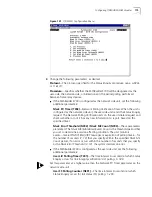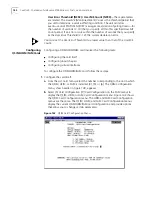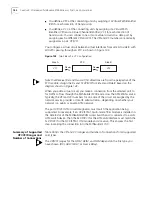
Configuring Virtual Circuits
193
ATM Module Virtual Circuit Parameters
The following virtual circuit parameters are specific to E3 UNI, DS3 UNI,
OC3/STM-1 UNI, DS1 UNI with IMA, and E1 UNI with IMA cards.
Group
—The IMA group number (if applicable).
Receive VPI
—The VPI of cells received.
Receive VCI
—The VCI of cells received.
Transmit VPI
—The transmit VPI of cells transmitted.
Transmit VCI
—The transmit VCI of cells transmitted.
The receive VPI/VCI and transmit VP/VCI numbers must be unique within their own
card.
Ethernet Module Virtual Circuit Parameters
You build connections from the local Ethernet port to a remote Ethernet port by
adding Permanent Virtual Circuits (PVCs). These connections allow the packets to
be transmitted through the ATM network to the destination port.
The following virtual circuit parameters are specific to Ethernet cards:
Shaper
—Select one of the 15 Shaper values that you configured under
Manage
Card
. You assign the
Shaper
value to ensure adequate traffic flow to and through
the ATM WAN. The
Shaper
parameter is key in ensuring that your traffic does not
exceed the negotiated traffic contract as administered by the service department
or IS department.
CBR Module Virtual Circuit Parameters
You set up an emulated circuit connection from the DSX-1 CBR or E1 CBR port to
a remote DSX-1 CBR or E1 CBR port by mapping DS1 circuits to permanent virtual
circuits (PVCs). These circuits are then transmitted through the ATM network to
the destination port.
The following virtual circuit parameters are specific to CBR cards:
Mode
(structured data ports only)
—
Virtual circuit mode:
Normal
(normal PVC
mode),
RS366
, or
DBA
.
Normal
—The circuit is configured as a standard PVC circuit and does not listen
to video signals.
RS366
—The circuit is put into an active listener mode; it listens for video
signals from premises devices. This mode is typically used in RS-366 video
session.s
DBA
—The circuit is configured to dynamically reassign the timeslot. This mode
supports dynamic bandwidth allocation.
CDV Buffer size
—The Cell Delay Variation for the provisioned CBR circuit as
indicated by the network (carrier) or external test measurement:
1-24 ms
.
Cell Loss Integration Period
—The amount of time the system will wait before
declaring cell loss state:
2000-65535 ms
.
Payload Size/Type
(structured voice DSX-1 ports only)—Select
data
or
voice
.
Select
voice
to configure a structured voice port for dynamic bandwidth allocation
(DBA).
Summary of Contents for 3C63400-3AC-C - PathBuilder S700 Switch
Page 14: ...xiv CHAPTER SUPPLEMENTARY REGULATORY INFORMATION ...
Page 18: ...4 ABOUT THIS GUIDE ...
Page 28: ...14 CHAPTER 1 SYSTEM DESCRIPTION ...
Page 88: ...74 CHAPTER 3 GETTING STARTED ...
Page 260: ...246 CHAPTER 6 PATHBUILDER S700 DIAGNOSTICS AND PERFORMANCE MONITORING ...
Page 270: ...256 INDEX ...






























